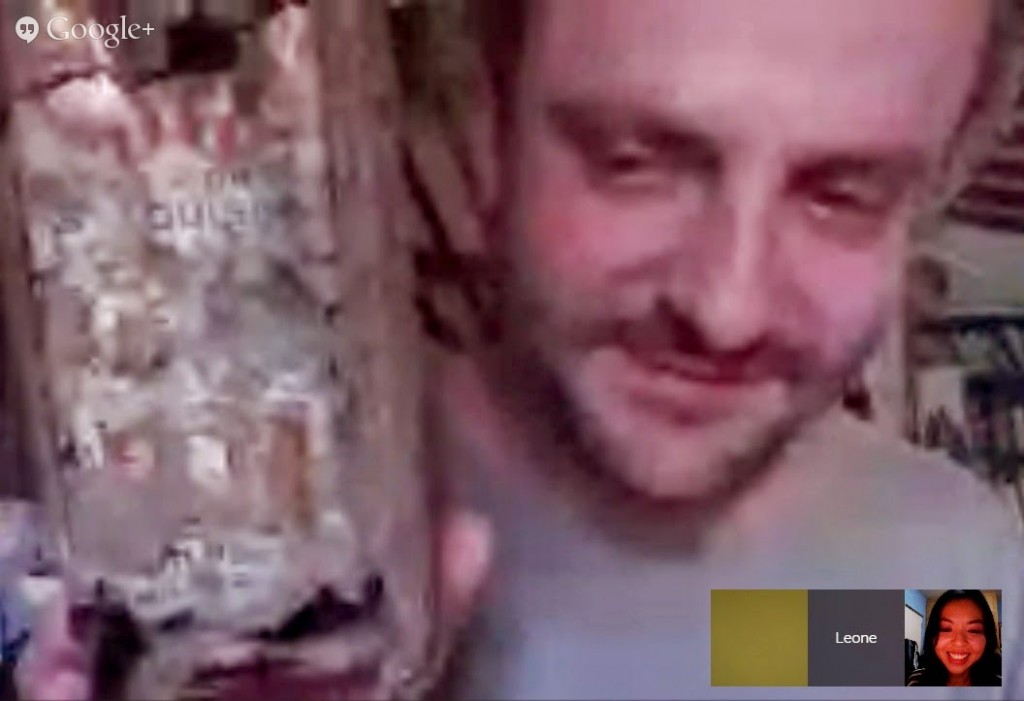The following excerpt is from the article written after a Google Hangout between Leone Contini and Jade Chen on 6 May 2015. This conversation discusses his lecture performance Imagined Menu, inspired by the worst military debacle in Italian history, the 1917 “Defite of Caporetto” and is part of the Artist-Writer Pair Series.
Read more in BrackMag Issue 1.

During the interview with Leone Contini. Here, he is showing us a tin of olive oil (manufactured in 1906) found in the trenches during World War 1!
The impetus for this project arose when Contini inherited two volumes of recipe books belonging to his great-uncle Giosuè Fiorentino, whom he has never met; his uncle passed away three months after Contini was born. In 1917, as a young man, Giosuè was among the troops sent to fight in the Battle of Caporetto, now in present day Slovenia.
“The main concept of defeat is crucial; it is the core of this project”, Leone Contini, the artist behind the Imagined Menu tells me over a virtual interview. Born in 1976 in Florence, Italy, he studied Philosophy and Cultural Anthropology at Universitàdegli Studi di Siena.
The impetus for this project arose when Contini inherited two volumes of recipe books belonging to his great-uncle Giosuè Fiorentino, whom he has never met; his uncle passed away three months after Contini was born. In 1917, as a young man, Giosuè was among the troops sent to fight in the Battle of Caporetto, now in present day Slovenia.
Along with his fellow soldiers — averaging eighteen or nineteen years old —who were reluctant to participate in the violence of combat, Giosuè surrendered to the enemy, where they were detained and deported to a prison camp in Cellelager, in northern Germany. There, they were left to starve by their enemies who barely provided sufficient subsistence for the men. The Italian government, who deemed them as cowards for having failed to perform their duty to the state as soldiers, barred any aid or food supplies to be sent. Giosuè and his fellow comrades were defeated and abandoned.
While imprisoned and malnourished, conversations about food and their previous lives before the war culminated in two volumes of cookbooks containing 250 recipes of early Italian cuisine of very diverse food traditions from different regions (Sardinia, Sicily, Florence, etc.), what Contini declares “the first real Italian cookbook” that ever existed in the history of Italy.
These young men, taken away from their homes while fresh out of manhood, stripped of their status as soldiers, detained as prisoners and labeled as cowards, were in an unimaginably dire and hopeless situation. Yet as Contini noted, “the war created new communities, from soldiers in the trenches, to prisoners. These men ended up in this situation but started to build a sense of community — they created a microcosm.”
While imprisoned and malnourished, conversations about food and their previous lives before the war culminated in two volumes of cookbooks containing 250 recipes of early Italian cuisine of very diverse food traditions from different regions (Sardinia, Sicily, Florence, etc.), what Contini declares “the first real Italian cookbook” that ever existed in the history of Italy. The cookbooks, he explained, were “a real patchwork of different food traditions, as if they wanted to recreate a sense of community in a way. It was their way of not giving up. It’s an action of resistance against war and the logic of war that lets them die of starvation, just because they were not good soldiers.”
